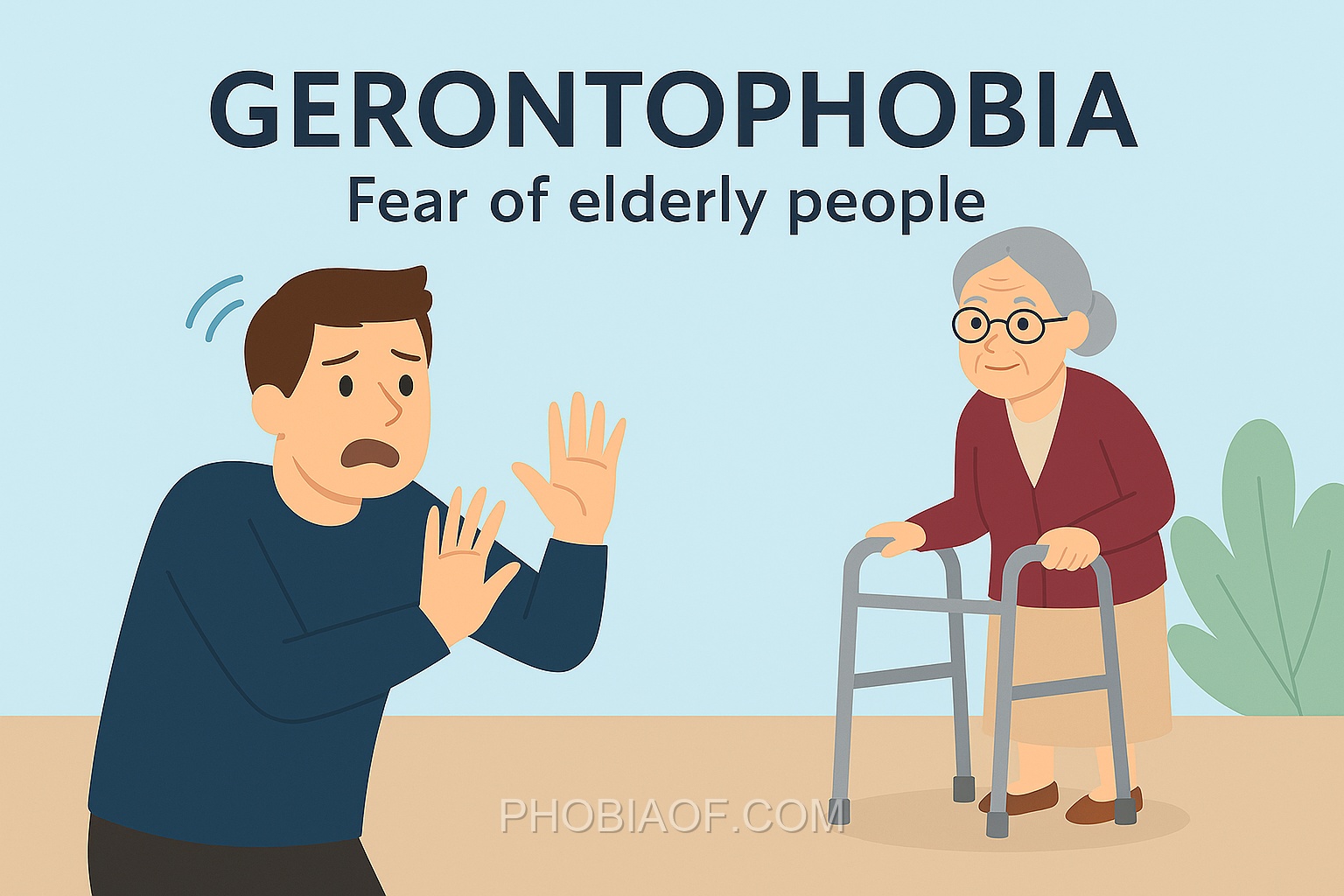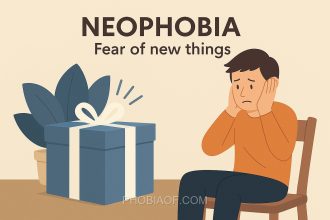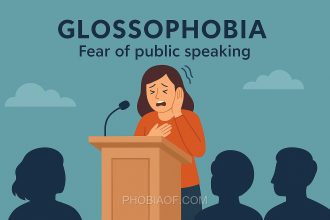Have you ever felt uneasy or anxious around elderly individuals? If so, you might be experiencing a phenomenon known as Gerontophobia, the fear of elderly people.
Gerontophobia is derived from the Greek words “geron,” meaning “old man,” and “phobos,” meaning “fear.” In simple terms, it refers to an irrational or excessive fear of older adults. This fear goes beyond the natural concern some may have about aging or the changes that come with it. Instead, it manifests as a distinct anxiety or aversion towards interacting with or even thinking about elderly individuals.
For those affected by gerontophobia, everyday encounters with older adults can become sources of stress and discomfort. This fear can lead to avoidance behaviors, where individuals go out of their way to prevent interactions with the elderly, potentially impacting their social life and relationships. Moreover, it can foster negative stereotypes and attitudes towards aging and older people, contributing to societal ageism.
Understanding and addressing gerontophobia is crucial, not only for those who experience it but also for creating a more inclusive and respectful society for people of all ages.
Causes of Gerontophobia
Gerontophobia, the fear of aging or fear of elderly people, can arise from a complex mix of factors. Understanding these causes can help in addressing the phobia effectively. Below are some potential reasons why someone might develop this fear:
- Genetic Predisposition:
Some individuals may have a genetic predisposition to anxiety disorders, including specific phobias like gerontophobia. Research suggests that if anxiety disorders run in a family, members might be more susceptible to developing similar conditions.
- Traumatic Experiences:
Experiencing or witnessing a traumatic event involving an elderly person can lead to lasting fear. For example, seeing a loved one suffer from age-related illnesses might trigger anxiety related to aging.
- Learned Behavior:
Phobias can also be learned by observing the reactions of others. If a person grows up around individuals who express fear or disdain towards aging, they might adopt similar attitudes.
- Psychological Factors:
Underlying psychological issues, such as a fear of mortality or loss of independence, might contribute to gerontophobia. The anxiety surrounding these concepts can manifest as fear of aging or elderly people.
- Environmental Influences:
Societal attitudes towards aging can impact individual perceptions. Cultures that glorify youth and associate aging with decline may foster gerontophobia in some individuals.
Research into phobias often highlights the interplay between nature and nurture. While genetic factors provide a predisposition, environmental influences and personal experiences play significant roles in shaping specific fears.
Addressing gerontophobia typically involves therapeutic approaches that focus on changing perceptions and coping mechanisms. Understanding the root causes can facilitate more effective treatment and foster empathy towards those affected by this phobia.
Symptoms of Gerontophobia
Gerontophobia, the fear of aging or fear of elderly people, can cause intense fear or anxiety in those who experience it. This condition can manifest in various ways, impacting both physical and emotional well-being. Recognizing these symptoms is a crucial step towards understanding and managing the phobia.
Common Physical Symptoms:
- Panic attacks, which may include chest pain, dizziness, or shortness of breath
- Excessive sweating, even in non-stressful situations
- Rapid heartbeat, particularly when confronted with reminders of aging or elderly people
- Trembling or shaking, often uncontrollably
- Nausea or gastrointestinal distress
Emotional and Behavioral Symptoms:
- Overwhelming dread when thinking about aging or being around elderly individuals
- Avoidance of places or situations that trigger fear, such as nursing homes or retirement parties
- Intense anxiety when confronted with personal aging or the aging of loved ones
- Feelings of helplessness or loss of control regarding aging
- Distress in maintaining relationships with elderly family members or friends
If the phobia is severe, these symptoms can significantly interfere with daily life, affecting personal relationships, work, and social activities.
Treatment for Fear of Elderly People
Gerontophobia, or the fear of elderly people, is a condition that can be treated and managed over time. It’s important to know that you’re not alone, and there are effective treatment options available to help you overcome this phobia. With patience and the right approach, you can learn to face and manage your fears.
Proven Therapies
Several therapies have been proven effective in treating gerontophobia:
- Exposure Therapy: This therapy involves gradually facing the fear in a controlled and supportive environment. By slowly and systematically being exposed to elderly people, the fear response can diminish over time.
- Cognitive-Behavioral Therapy (CBT): CBT helps in changing the fearful thoughts and beliefs associated with elderly people. By identifying and challenging negative thought patterns, you can reduce the fear and anxiety.
- Counseling: Speaking with a counselor can provide a safe space to discuss your fears and anxieties. A counselor can offer support and guidance as you work through your phobia.
Self-Help Coping Techniques
Alongside professional therapy, self-help techniques can be beneficial in managing gerontophobia:
- Relaxation Exercises: Techniques such as deep breathing, progressive muscle relaxation, and visualization can help reduce anxiety when faced with fear-inducing situations.
- Meditation: Regular meditation practice can help calm the mind and reduce overall anxiety levels, making it easier to face fears.
- Support Groups: Joining a support group allows you to share your experiences with others who understand what you’re going through, providing encouragement and solidarity.
Medication
In some severe cases, medication such as anti-anxiety meds may be prescribed to help manage symptoms. However, the focus should remain on therapy and developing coping skills.
If gerontophobia is interfering with your life, it’s crucial to seek professional help. Remember, overcoming a phobia is a journey, and reaching out for support is a positive step forward. You’re capable of managing this fear, and with the right resources, a more comfortable relationship with elderly people is within reach.
Conclusion
Understanding gerontophobia—its causes, symptoms, and effects—empowers individuals to take proactive steps towards addressing this often-overlooked fear. By recognizing the roots of this phobia, whether they stem from personal experiences or societal influences, individuals can begin to dismantle the misconceptions that fuel their anxiety.
Recognizing the symptoms, such as avoidance and anxiety when interacting with the elderly, is the first step in managing this fear. Equipped with this knowledge, you can take informed actions towards overcoming gerontophobia. Remember, many people successfully manage or even overcome their phobias with time, patience, and the appropriate support.
Take action today: If you or someone you know is struggling with gerontophobia, consider reaching out to a mental health professional. Therapy can provide valuable tools and strategies for coping. Speaking with a doctor can also offer additional support and guidance. Remember, you are not alone, and help is available.
With understanding and professional assistance, it is entirely possible to reduce the fear and anxiety associated with gerontophobia. Embrace the journey toward a more open and accepting perspective, and take heart in knowing that positive change is within reach.






